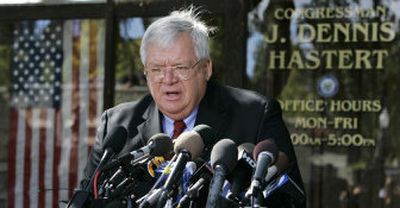House panel to investigate Foley scandal

WASHINGTON – The House ethics committee on Thursday opened a broad investigation into the sex scandal surrounding the congressional page system, a furor that has ended the political career of one lawmaker and jeopardized the leadership position of House Speaker Dennis Hastert, R-Ill.
Hastert, at a news conference in his home district, rejected calls that he resign as speaker in the face of criticism that his office reacted too slowly to the first signs of a problem. At the same time, he moved to quell the controversy with a pointed statement accepting responsibility for the handling of the matter, capped by revelations that Rep. Mark Foley, R-Fla., had sent sexually explicit instant messages to teens who had served as House pages.
“I am deeply sorry that this has happened,” Hastert said. “Ultimately, as someone said in Washington before, the buck stops here.”
Foley resigned from Congress last Friday after ABC News questioned him about two sets of explicit messages.
Even as Hastert offered a note of contrition and the two parties joined in the ethics probe, partisan sparks continued to crackle.
Republicans implied that Democrats were behind the timing of the scandal’s emergence and accused House Minority Leader Nancy Pelosi, D-Calif., of blocking a plan by Hastert to appoint former FBI Director Louis Freeh to review the page program.
ABC News reported Thursday that three more former pages had come forward with accounts of receiving sexually explicit instant messages and e-mails from Foley. A GOP-friendly Web site, the Drudge Report, had published allegations earlier Thursday that one of the two sets of instant messages initially given to ABC was a “prank” by another former page to goad Foley into writing the explicit messages.
“This was no prank,” one of the three who came forward Thursday told ABC.
Several Republicans said they did not believe that the ethics probe and Hastert’s apology would tamp down the controversy over the scandal and questions about how GOP leaders handled it – especially following a charge earlier this week by Foley’s former top aide, Kirk Fordham, that Hastert’s staff had been warned of potential problems far earlier than they have acknowledged.
Some GOP leaders issued statements of support for Hastert in a concerted effort to close the divisions that have emerged in the party’s upper ranks.
But most House Republicans remained silent, and some strategists confided that they believed the party and its leaders were still not out of the woods.
“Is the speaker going to survive? I don’t know,” said Rep. Jeff Flake, R-Ariz.
Said GOP pollster Tony Fabrizio: “My biggest fear is: What is the next shoe?”
But White House spokesman Tony Snow cast doubt on the fear that the misconduct of one Republican would tarnish others.
“Come Election Day the question is whether people are going to be voting on the basis of disgusting IMs between a grown man and a young man, or something that’s probably more important to everybody, which is safety, security and prosperity,” he said.
Fordham said Wednesday that he had informed Hastert’s office more than two years ago of Foley’s “inappropriate behavior” around the teenage pages. He was interviewed Thursday by the FBI, which is conducting a separate inquiry. Hastert’s chief of staff has denied Fordham’s account.
Separately, staffers in the office of Rep. Rodney Alexander, R-La., went to the clerk of the House and the head of the House Page Board last year after a boy Alexander had sponsored as a page complained of receiving overly friendly, although not explicit, e-mails from Foley. Foley was told to stop contacting the boy.
Earlier this year, Alexander himself raised the issue with House Majority Leader John A. Boehner, R-Ohio, and Rep. Thomas M. Reynolds, R-N.Y., head of the National Republican Congressional Committee. Reynolds said he discussed the problem with Hastert, who has said he does not remember the conversation but does not dispute Reynolds’ account of it.